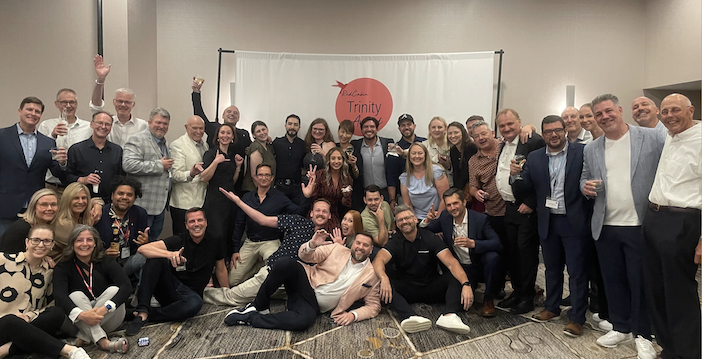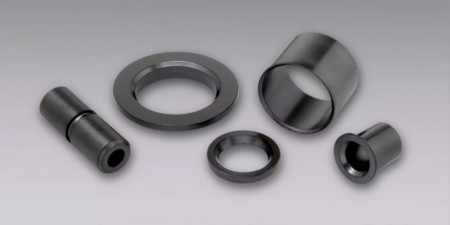The winners of the inaugural RedCabin Trinity Awards – sponsored by Boeing Commercial Airplanes, Sekisui Kydex, DIAB and Tapis – have been revealed at the Aircraft Cabin Innovation Summit (ACIS), held at American Airlines’ Skyview Campus.
The winners were selected from a shortlist of 21 nominated concepts encompassing everything from passenger experience to cabin service and sustainability, and RedCabin believes that each has the potential to make a significant impact on the industry. The RedCabin Trinity Awards are designed to celebrate innovation across the aircraft interiors industry. Entries are judged against strict criteria, including how likely it is that the concept will become a reality, and its potential benefits in terms of cost reduction, efficiency, sustainability and the ability to improve the passenger experience.
The winners of the awards are:
Passenger Experience Concepts
Winner: Euphony from Safran. Euphony is a technology that incorporates speakers inside an aircraft seat headrest, providing directed audio to the passenger’s ears without disturbing other passengers in the cabin. Safran says it is the first integrated audio system adapted to an aircraft cabin interior environment, and was developed in a collaboration with Devialet.
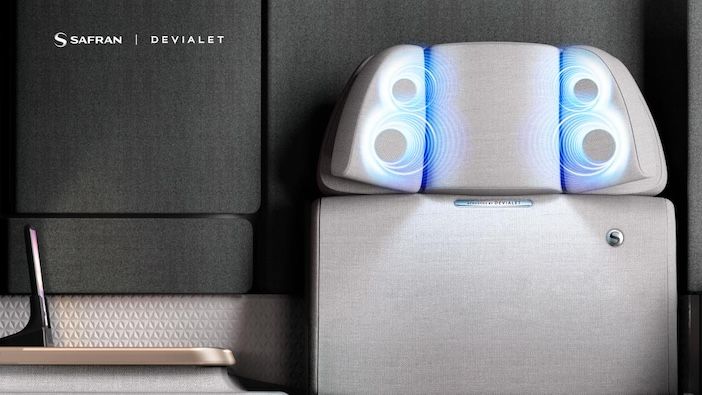
Runners up:
‘Air 4 All’ from Delta Flight Products (developed with PriestmanGoode, Flying Disabled and SWS Certification) eliminates the need for people with disabilities to transfer from their own wheelchair into an airline seat. The design enables powered wheelchair users to remain in the safety of their own chair for the entire journey (a chair usually modified to meet their individual needs), enhancing comfort and dignity, and reducing the risk of chairs being damaged during air travel.
The ‘eSmart Lavatory’ from Diehl Aviation includes touchless controls for a hygienic environment. An innovative smart mirror transforms the lavatory space into an interactive centre that displays digital content, while a time management system allows passengers to book time slots in the lavatory via smartphone.
Sustainability Concepts
Winner: The ‘Ultra Slim Low Carbon Seat’ from Doy Design. This circular economy seat concept is designed to reduce embedded carbon by 70% and deliver an average weight of 6.6kg per passenger place. The seat is aimed at passengers who want to reduce their impact on the environment, and airlines that want to deliver an environmentally focused service as part of their USP.
The seat was developed in partnership with Sabeti Wain Aerospace, Impression Technologies, AIRA (Aircraft Interior Recycling Associates), Gen Phoenix and Gränges Konin.
Discussing the win, Gary Doy, founder of Doy Design commented, “For us it’s not only about the seat, but about the industry recognising they need to do something with sustainability, using knowledge, collaboration and learning to look outside the industry for inspiration. This win is one for sustainability as a whole.”
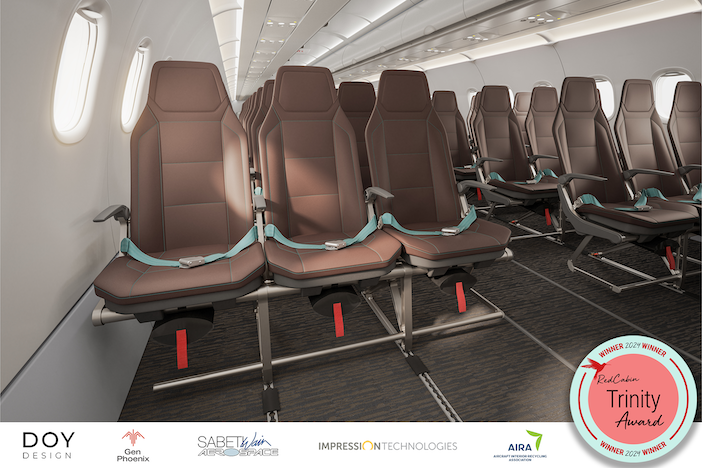
Runners up:
The ‘Sustainable panel for cabin interior’ from Diab Group is a sustainable lightweight panel for aircraft interiors that combines the advantages of Diab’s ‘Divinycell F’ structural foam core and thermoplastic organosheets. Using only materials already used and qualified by aerospace OEMs, and developed with Applus+ Rescoll and Akzo Nobel, the panel is fully compliant with all industry requirements. Diab has demonstrated the recyclability potential of such a panel, which already includes recycled content from Diab’s production waste and is thus 100% waste-free.
Expliseat’s latest model, the TiSeat 2X, features an ultra-light all-carbon and titanium structure with recycled components and minimal plastic, with comfort provided by leather and ergonomic foams. The exact weight is undisclosed, but Expliseat says it is 30% lighter than a traditional economy-class aircraft seat. Expliseat has secured a launch customer, with Air France installing TiSeat 2X as part of the cabin renewal programme for the Embraer 190 fleet operated by HOP!, its regional subsidiary.
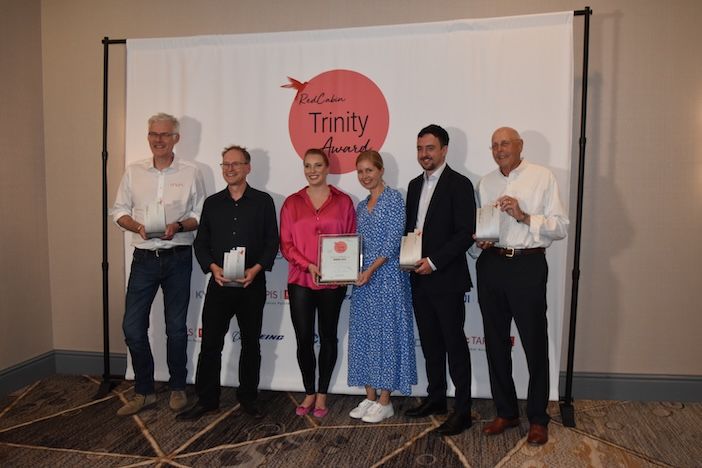
Cabin Service Concepts
Winner: ‘Door 2.0 – The Zen Door’ from Unum Aircraft Seating. The design of this easy-to-certify privacy door for business-class seating is inspired by the art of origami, or paper folding. This inspiration has been applied to create a simple and lightweight door concept that can be quickly unfolded from its stowed position to create a privacy door.
Unum Aircraft Seating is confident that the patented design, created in a collaboration with MGR Foamtex, would not present major certification challenges, and could be a relatively low-cost option.
Commenting on the win, Alan McInnes, VP of business development at Unum Aircraft Seating said, “Problem solving drives innovation, so our aim is to understand the problems that airlines have and solve them.”

Runners up:
The ‘Jump Seat Duo’ concept from J&C Aero serves as both a cabin attendant seat (CAS) and an onboard wheelchair for passengers with reduced mobility. The design utilises existing attachment points on monuments, for a hassle-free upgrade process. J&C Aero says the product is 16G compliant and specifically tailored for narrow-body aircraft.
Blending cabin interiors with technology, the ‘Clear Cabin’ from ACLA Studio (developed in partnership with Boeing Encore Interiors) is a class divider with an integrated 33in transparent OLED screen. The incorporation of a digital screen transforms the once mundane divider into a valuable asset, which can show passengers anything from real-time flight information, to enticing food and beverage options, and seamless navigation to connecting flights.
Best of RedCabin Award
Delegates at the Aircraft Cabin Innovation Summit also voted for the Best of RedCabin Award, in recognition of a speaker, moderator or workshop leader in the 2024 Summit programme, who they felt reinforced the overall ethos and collaborative culture of the RedCabin event. Condor Flugdienst GmbH’s Yvonne Noack (senior product manager) and Louisa Ruster (head of product) won the award for their session on ‘Product specification and innovations for Condor’s A32Xneo fleet’.
Influential/Lifetime Achievement award

The Trinity Awards ceremony also recognised those with a legacy of achievement in the industry. Ben Bettell was personally chosen by RedCabin CEO Monica Wick to receive the Influential/Lifetime Achievement award. Perhaps the best-known aviation consultant in the aircraft interiors sector, Bettell received his award to a standing ovation from the delegates.
Cristian Sutter, CEO of Avensis, said of the win: “A lot of people in this room owe their careers to Ben. He’s the godfather of aviation! To not only get to know him but to be his friend is an honour.”
Collaboration for innovation
The inaugural RedCabin Trinity Awards winners were announced at the conclusion of the second day of the RedCabin ACIS in Fort Worth. The award trophies were designed by Teague and produced by The Aviation AM Centre GmbH.
Monica Wick, founder of RedCabin, commented: “The RedCabin Trinity Awards have demonstrated an incredible level of collaboration to drive innovation in the industry. I wish to congratulate all the winners, who demonstrate huge commitment to the delivery of more sustainable and effective solutions for the industry, driving improved passenger experiences. However, every entry into the awards demonstrated the huge levels of innovation taking place in the industry today.”
“From its inception, RedCabin has been the driving force for bringing the industry together and therefore it is appropriate that the awards have been celebrated here at the ACIS event in Fort Worth. We will provide the winners with the opportunity to collaborate with an airline and help make the business case happen for their innovation.”


